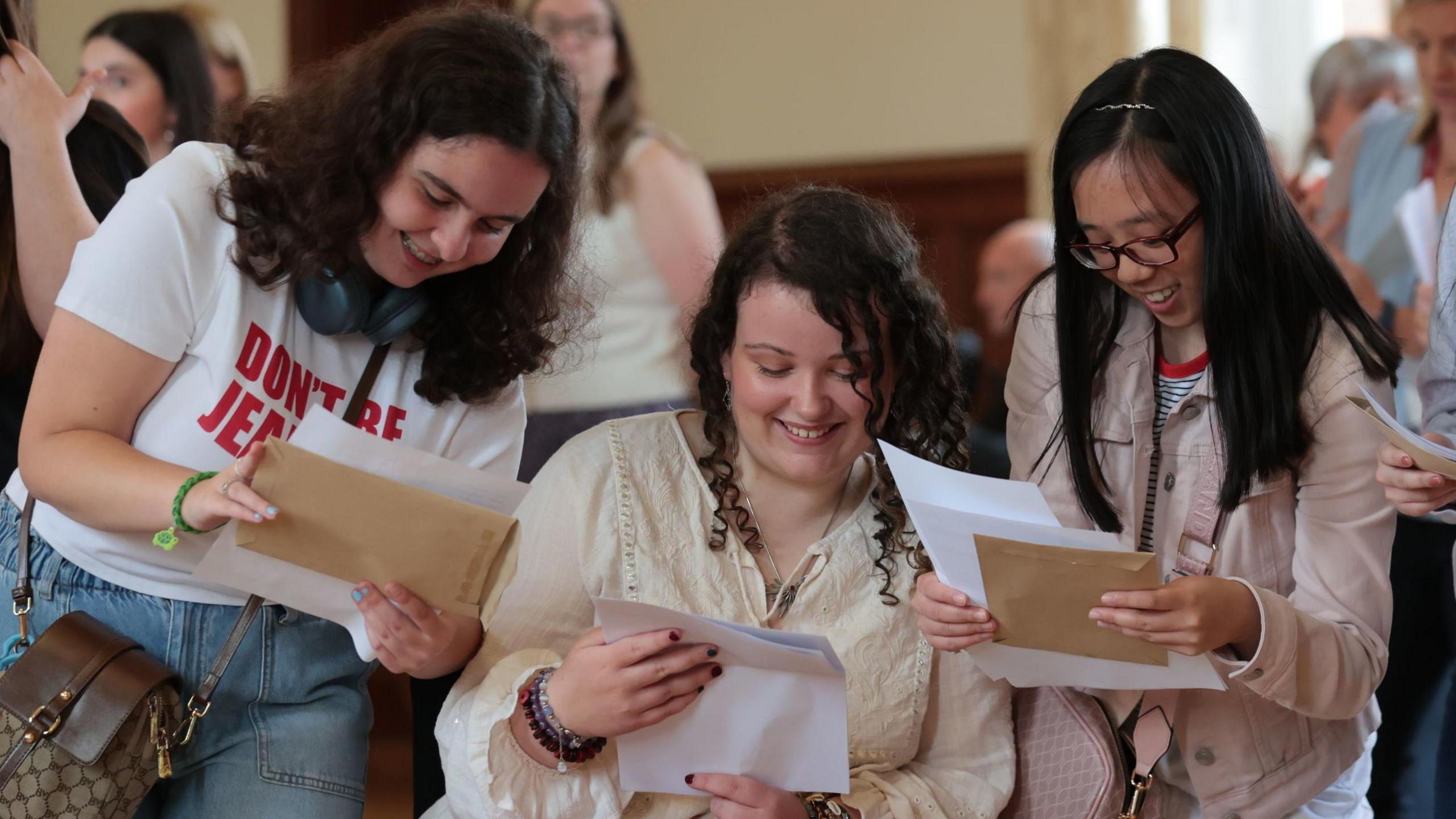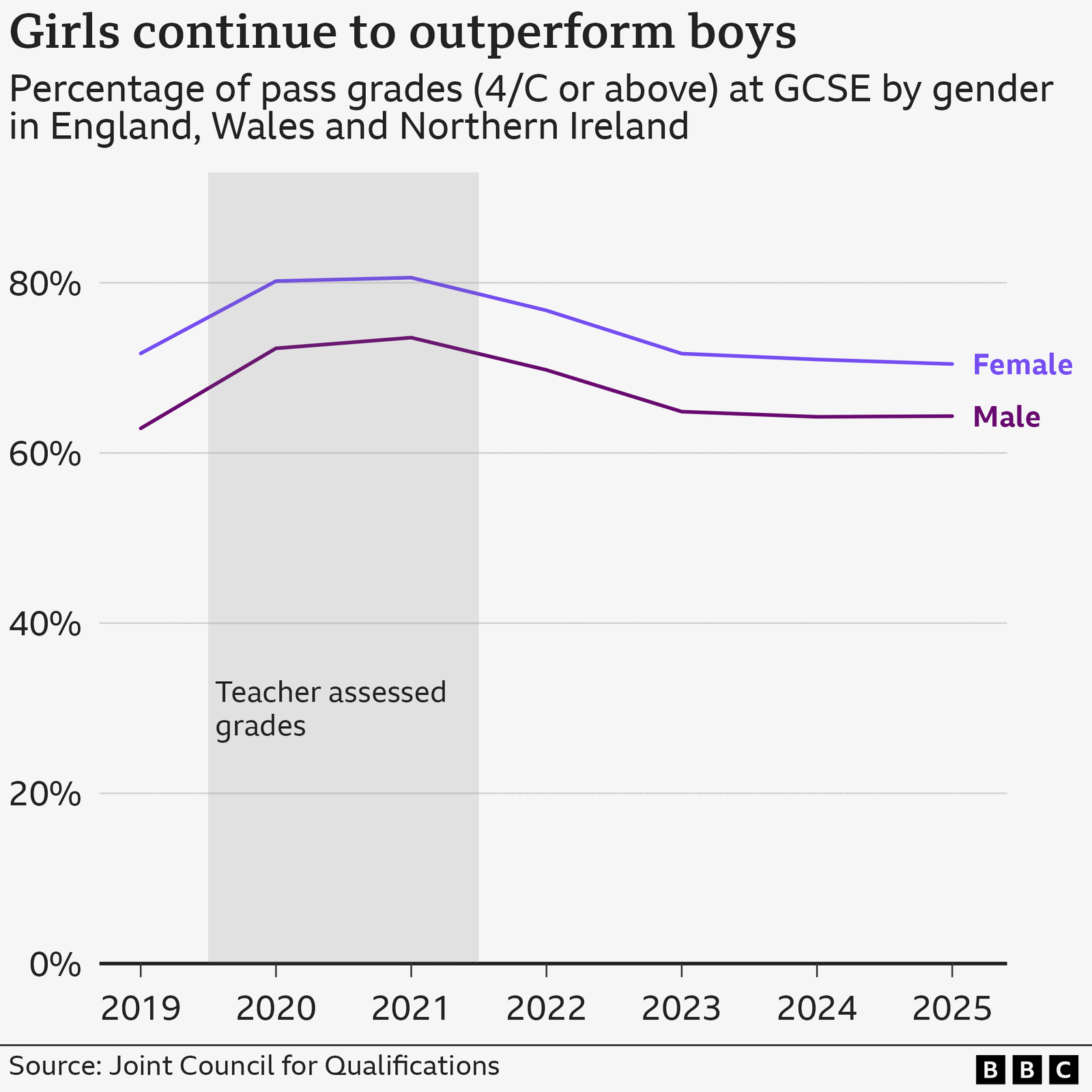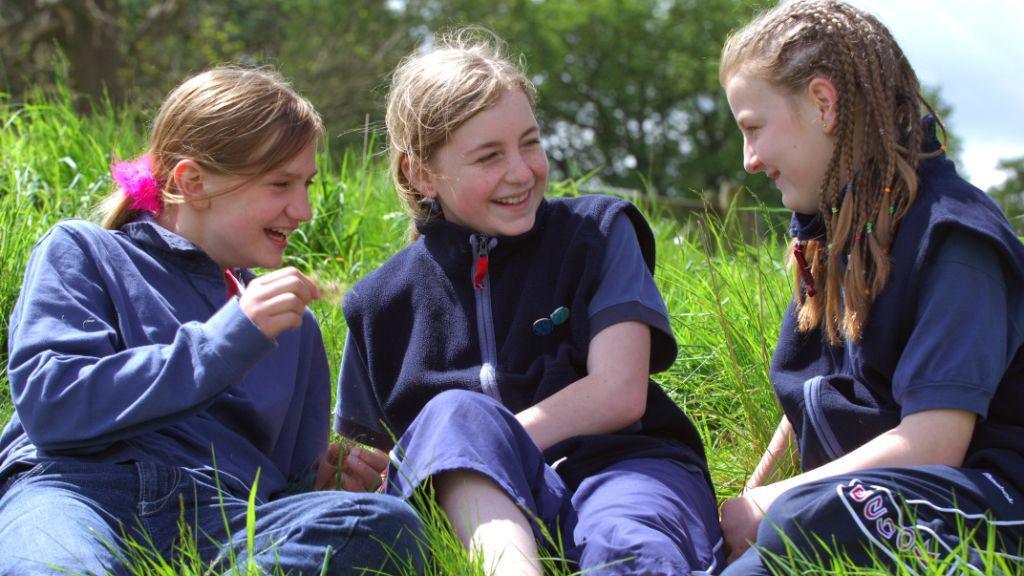Are girls being left behind in school? Experts are sounding the alarm

- Published
Girls are more likely to pass their GCSEs than boys.
This year, like every year, that remained the case - with 70.5% of girls' grades across England, Wales and Northern Ireland at 4/C or above, compared to 64.3% of boys'.
But this year the girls' pass rate dropped, while boys' rose very slightly.
The result? The gap between the two was its narrowest on record.
Meanwhile, boys have taken the lead in getting top marks at A-level.
It's prompted warnings that there's something odd happening with girls, which needs to be addressed before their grades slip further and it's "too late".
Five key takeaways from this year's GCSE results
- Published21 August
Five key takeaways from 2025's A-level results
- Published14 August
Why did boys outperform girls at top A-level grades?
- Published14 August
There has been a lot of focus on boys' attainment recently. The Netflix series Adolescence sparked renewed interest in their academic struggles and fears they are "being left behind".
MPs have also raised concerns about it, and the Department for Education (DfE) in England says it wants to ensure that "white working-class pupils - especially boys - are supported to thrive".
Natalie Perera, chief executive of the Education Policy Institute (EPI) think tank, said: "It doesn't need to be an either or with girls and boys, we should be looking at what's driving low attainment for both."
But she added: "But we do need to start looking at what's driving the decline in girls attainment before it gets too late."

EPI analysis suggests girls' performance has been "declining in absolute terms" since the Covid pandemic, and is linked to "worrying trends around girls' wellbeing" such as worsening mental health, a lack of sleep and social media use.
EPI points to NHS data from 2023, which suggests a higher percentage of girls and women aged between 17 and 19 in England had a "probable" mental health disorder, compared to boys and men.
"You can draw a reasonable hypothesis, which suggests that if girls aren't getting enough sleep, if they're experiencing that their anxiety or even things like eating disorders, that is likely to affect their attendance, how well they're able to concentrate in school and how well they're able to concentrate and perform on exam day," said Ms Perera.
"If their attainment continues to decline and that follows through to A-levels and participation in university, then that could have an effect on both labour market participation and pay disparity as well, or pay equality."
The proportion of pupils who are persistently absent from school in England (missing 10% or more) has grown for both boys and girls since the pandemic - but there's been a greater rise among girls.
Girls are now more likely to be persistently absent. According to DfE figures 21.9% of girls were persistently absent from secondary schools last year, compared to 20.3% of boys.
What are T-levels and what are the grades worth?
- Published22 August
What are BTecs and how are they graded?
- Published22 August
What is an apprenticeship and how much are apprentices paid?
- Published2 days ago
An international study in March suggested that girls lagged further behind boys in maths and science than they had in 2020.
Dr Jennie Golding, UCL professor and co-author of the report, said the improvement in boys' GCSE results this year could be seen as a "good news story", particularly as these students were "significantly impacted by Covid, and had a rubbish experience of transfer to secondary school".
But she said challenges that many students face, such as social media use, disproportionately affected girls.
"We know that all sorts of aspects of emotional wellbeing impact academic performance - they are all interrelated," she said.
She called for greater emphasis on "belonging and emotional security" to help girls in schools.
"Start measuring those in your Ofsted inspections, and you very quickly turn around priorities in schools," she said.

Girlguiding says it produces resources for schools that help to boost girls' confidence.
Girlguiding, which works with more than 300,000 girls between the ages of four and 18, is especially worried about the impact of misogyny on girls.
"Mounting societal pressures and misogyny are having a devastating impact on girls, their mental wellbeing and confidence," said acting chief executive Amanda Azeez.
"Girls as young as seven say they feel lonely with no one to talk to which is also adversely impacting their confidence. Girlguiding is urging schools to listen to girls about their experiences of misogyny and how it impacts their learning and wellbeing."
Girls are also more likely to get top grades (7/A and above) at GCSE than boys. That gap reached its widest in 2021, the second year that exams were cancelled and grades were based on teachers' assessments. It has shrunk since.
In 2021, England's exams regulator Ofqual looked into whether there was evidence of "systematic divergence between teacher-based results and test-based results". It found, external gender bias was "mixed" but there was "a slightly bias in favour of girls".
Pepe Di'Iasio, general secretary of the Association of School and College leaders and former head teachers, said more research was needed into why girls were falling behind.
He hoped the curriculum review, due this autumn, would "look at how best we can move assessment methods forward so that every student has the ability and the opportunity to be assessed in a way that enables them to best show all their greatest attributes".